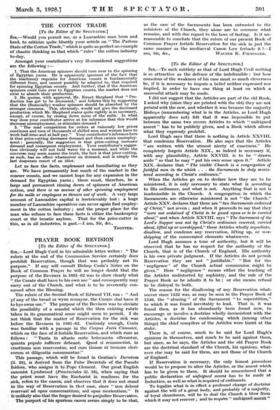THE COTTON TRADE
[To the Editor of the SPECTATOR.]
SIR,—Would you permit me, as a Lancashire man born and bred, to criticize quite bluntly your article on " The Parlous State of the Cotton Trade," which is quite as perfect an example of chaotic thinking as that which "rules" the cotton industry to-day.
Ainongst your contributor's very ill-considered suggestions are the following :-
1. That the American spinners should turn over to the spinning of Egyptian yarns. He is apparently ignorant of the fact that the machinery requisite for American counts is fundamentally different from, and cannot possibly be adapted to, that required for spinning Egyptian counts. And further, that if the American spinners could turn over to Egyptian counts, the market does not exist to absorb their production.
2. He quotes, with approval, Mr. Esyart Shepherd that " Pro- duction has got to be decreased," and followi this by suggesting that the (financially) weaker spinners should be absorbed by the stronger concerns. This, obviously, would not give the decreased production which Mr. Shepherd states quite rightly is so necessary, except, of course, by closing down some of the mills. In what way does your contributor arrive at his inference that this would decrease unemployment, or stimulate demand ?
3. " The mad competition for orders at ruinously low prices continues and tens of thousands of skilled men and women have to work half-time and at half-pay." Your contributor's inference here is that price-cutting decreases demand and thus causes unemploy- ment : generally, the suggestion is that- price-cutting increases demand and consequent employment. Your contributor's sugges- tion obviously will not hold water for a moment, and while the
converse may seem nearer the truth, the is that price-cutting, as such, has no effect whatsoever on demand, and is simply the last desperate resort of an idiot.
- Let us face the facts, unpleasant and humiliating as they are. We have permanently lost much of the market in the coarser counts, and we cannot hope for any expansion in the demand for Egyptian yarns ; there must, therefore, be a large and permanent closing down of spinners of American cotton, and there is no avenue of other spinning employment for the mills or employees so thrown out of work. A very large amount of Lancashire capital is irretrievably lost : a huge number of Lancashire operatives can never again find employ- ment in the cotton industry ; and the proper place for the man who refuses to face these facts is either the bankruptcy court or the lunatic asylum. That for the price-cutter in this, as in all industries, is gaol.—I am, Sir, &c., TROTTER.






























































 Previous page
Previous page